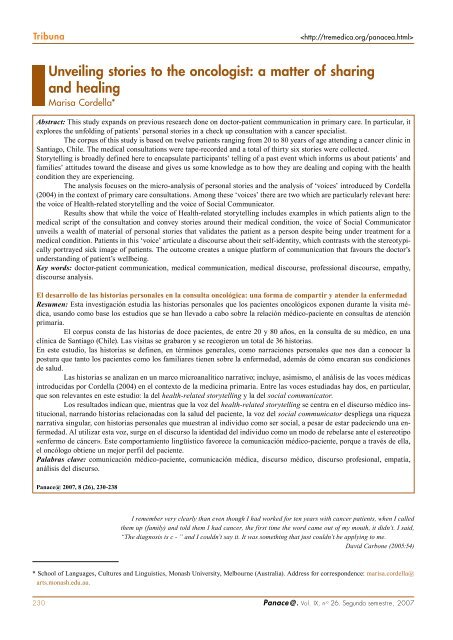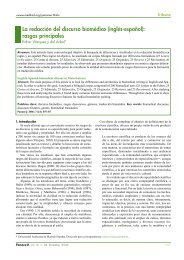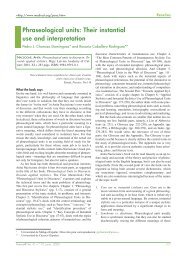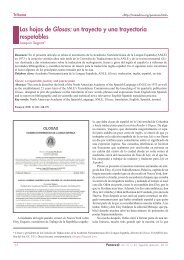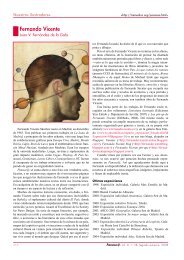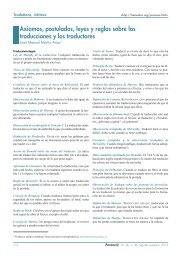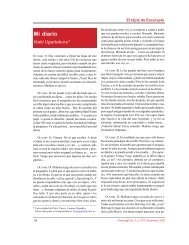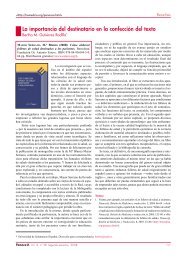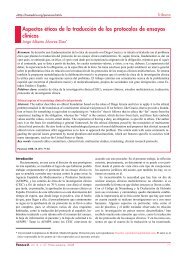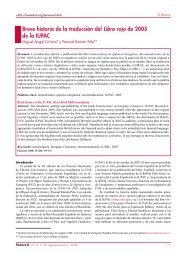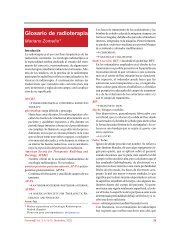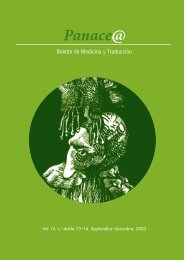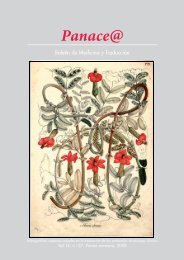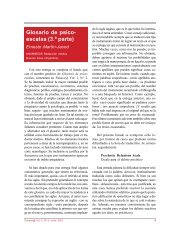Panace@ 26. Diciembre del 2007 - Tremédica
Panace@ 26. Diciembre del 2007 - Tremédica
Panace@ 26. Diciembre del 2007 - Tremédica
You also want an ePaper? Increase the reach of your titles
YUMPU automatically turns print PDFs into web optimized ePapers that Google loves.
Tribuna<br />
<br />
Unveiling stories to the oncologist: a matter of sharing <br />
and healing<br />
Marisa Cor<strong>del</strong>la*<br />
Abstract: This study expands on previous research done on doctor-patient communication in primary care. In particular, it<br />
explores the unfolding of patients’ personal stories in a check up consultation with a cancer specialist.<br />
The corpus of this study is based on twelve patients ranging from 20 to 80 years of age attending a cancer clinic in<br />
Santiago, Chile. The medical consultations were tape-recorded and a total of thirty six stories were collected.<br />
Storytelling is broadly defined here to encapsulate participants’ telling of a past event which informs us about patients’ and<br />
families’ attitudes toward the disease and gives us some knowledge as to how they are dealing and coping with the health<br />
condition they are experiencing.<br />
The analysis focuses on the micro-analysis of personal stories and the analysis of ‘voices’ introduced by Cor<strong>del</strong>la<br />
(2004) in the context of primary care consultations. Among these ‘voices’ there are two which are particularly relevant here:<br />
the voice of Health-related storytelling and the voice of Social Communicator.<br />
Results show that while the voice of Health-related storytelling includes examples in which patients align to the<br />
medical script of the consultation and convey stories around their medical condition, the voice of Social Communicator<br />
unveils a wealth of material of personal stories that validates the patient as a person despite being under treatment for a<br />
medical condition. Patients in this ‘voice’ articulate a discourse about their self-identity, which contrasts with the stereotypically<br />
portrayed sick image of patients. The outcome creates a unique platform of communication that favours the doctor’s<br />
understanding of patient’s wellbeing.<br />
Key words: doctor-patient communication, medical communication, medical discourse, professional discourse, empathy,<br />
discourse analysis.<br />
El desarrollo de las historias personales en la consulta oncológica: una forma de compartir y atender la enfermedad<br />
Resumen: Esta investigación estudia las historias personales que los pacientes oncológicos exponen durante la visita médica,<br />
usando como base los estudios que se han llevado a cabo sobre la relación médico-paciente en consultas de atención<br />
primaria.<br />
El corpus consta de las historias de doce pacientes, de entre 20 y 80 años, en la consulta de su médico, en una<br />
clínica de Santiago (Chile). Las visitas se grabaron y se recogieron un total de 36 historias.<br />
En este estudio, las historias se definen, en términos generales, como narraciones personales que nos dan a conocer la<br />
postura que tanto los pacientes como los familiares tienen sobre la enfermedad, además de cómo encaran sus condiciones<br />
de salud.<br />
Las historias se analizan en un marco microanalítico narrativo; incluye, asimismo, el análisis de las voces médicas<br />
introducidas por Cor<strong>del</strong>la (2004) en el contexto de la medicina primaria. Entre las voces estudiadas hay dos, en particular,<br />
que son relevantes en este estudio: la <strong>del</strong> health-related storytelling y la <strong>del</strong> social communicator.<br />
Los resultados indican que, mientras que la voz <strong>del</strong> health-related storytelling se centra en el discurso médico institucional,<br />
narrando historias relacionadas con la salud <strong>del</strong> paciente, la voz <strong>del</strong> social communicator despliega una riqueza<br />
narrativa singular, con historias personales que muestran al individuo como ser social, a pesar de estar padeciendo una enfermedad.<br />
Al utilizar esta voz, surge en el discurso la identidad <strong>del</strong> individuo como un modo de rebelarse ante el estereotipo<br />
«enfermo de cáncer». Este comportamiento lingüístico favorece la comunicación médico-paciente, porque a través de ella,<br />
el oncólogo obtiene un mejor perfil <strong>del</strong> paciente.<br />
Palabras clave: comunicación médico-paciente, comunicación médica, discurso médico, discurso profesional, empatía,<br />
análisis <strong>del</strong> discurso.<br />
<strong>Panace@</strong> <strong>2007</strong>, 8 (26), 230-238<br />
I remember very clearly than even though I had worked for ten years with cancer patients, when I called<br />
them up (family) and told them I had cancer, the first time the word came out of my mouth, it didn’t. I said,<br />
“The diagnosis is c - ” and I couldn’t say it. It was something that just couldn’t be applying to me.<br />
David Carbone (2005:54)<br />
* School of Languages, Cultures and Linguistics, Monash University, Melbourne (Australia). Address for correspondence: marisa.cor<strong>del</strong>la@<br />
arts.monash.edu.au.<br />
230 <strong>Panace@</strong>. Vol. IX, n .o <strong>26.</strong> Segundo semestre, <strong>2007</strong>


